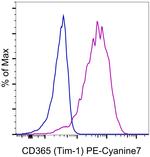Search Thermo Fisher Scientific
Invitrogen
CD365 (TIM1) Monoclonal Antibody (1D12-TIM1), PE-Cyanine7, eBioscience™
This Antibody was verified by Knockdown to ensure that the antibody binds to the antigen stated.
FIGURE: 1 / 2
CD365 (TIM1) Antibody (25-3659-42) in Flow


Product Details
25-3659-42
Species Reactivity
Host/Isotype
Recommended Isotype Control
Class
Type
Clone
Immunogen
Conjugate
Excitation/Emission Max
Form
Concentration
Purification
Storage buffer
Contains
Storage conditions
Shipping conditions
RRID
Product Specific Information
Description: This 1D12-TIM1 monoclonal antibody recognizes human CD365 also known as Tim-1, Kim-1 or Havcr1. This antibody was generated using the immunoglobulin V domain of the extracellular part of the CD365 receptor, and is predicted to recognize all three haplotypes of human CD365. Clone 1D12-TIM1 has been shown to block entry of HCV virus into human hepatoma Huh7.5 cells in a dose dependent manner. It has been also shown to block the uptake of apoptotic cells by CD365-expressing 769-P cells.
Applications Reported: This 1D12-TIM1 antibody has been reported for use in flow cytometric analysis.
Applications Tested: This 1D12-TIM1 antibody has been pre-diluted and tested by flow cytometric analysis of A549. This may be used at 5 µL (0.125 µg) per test. A test is defined as the amount (µg) of antibody that will stain a cell sample in a final volume of 100 µL. Cell number should be determined empirically but can range from 10^5 to 10^8 cells/test.
Light sensitivity: This tandem dye is sensitive to photo-induced oxidation. Please protect this vial and stained samples from light.
Fixation: Samples can be stored in IC Fixation Buffer (Product # 00-8222-49) (100 µL of cell sample + 100 µL of IC Fixation Buffer) or 1-step Fix/Lyse Solution (Product # 00-5333-57) for up to 3 days in the dark at 4°C with minimal impact on brightness and FRET efficiency/compensation. Some generalizations regarding fluorophore performance after fixation can be made, but clone specific performance should be determined empirically.
Excitation: 488-561 nm; Emission: 775 nm; Laser: Blue Laser, Green Laser, Yellow-Green Laser.
Target Information
CD365 also known as T-cell immunoglobulin and mucin domain 1 (Tim-1) is a type 1 surface glycoprotein that consists of extracellular N-terminal immunoglobulin V-like domain and a mucin domain, and a short cytoplasmic tail. The endogenous ligand for CD365 is Tim-4. In addition, CD365 is known to be a cellular receptor or co-receptor for a number of viruses including hepatitis A and C viruses, Ebola virus, Marburg virus, Dengue virus, Zika virus, West Nile virus, and Japanese encephalitis virus. The direct binding of the viruses by CD365 occurs via phosphatildyl-serine exposed on viral envelopes. Polymorphisms within human CD365 gene (HAVCR1) are associated with susceptibility to infection and the disease severity. CD365 has also been implicated in the T cell co-stimulation. CD365 is primarily expressed in epithelial cells. It is also highly expressed in A549, 769-P and Caco-2 and cell lines. CD365 exists also as a soluble protein generated by metalloproteinase mediated proteolytic cleavage of the surface protein.
For Research Use Only. Not for use in diagnostic procedures. Not for resale without express authorization.
How to use the Panel Builder
Watch the video to learn how to use the Invitrogen Flow Cytometry Panel Builder to build your next flow cytometry panel in 5 easy steps.
References (0)
Bioinformatics
Protein Aliases: CD365; HAVcr-1; Hepatitis A virus cellular receptor 1; Kidney injury molecule 1; KIM-1; T cell immunoglobin domain and mucin domain protein 1; T-cell immunoglobulin and mucin domain-containing protein 1; T-cell immunoglobulin mucin family member 1; T-cell immunoglobulin mucin receptor 1; T-cell membrane protein 1; TIM; TIMD-1
Gene Aliases: CD365; HAVCR; HAVCR-1; HAVCR1; KIM-1; KIM1; TIM; TIM-1; TIM1; TIMD-1; TIMD1
UniProt ID: (Human) Q96D42
Entrez Gene ID: (Human) 26762

Performance Guarantee
If an Invitrogen™ antibody doesn't perform as described on our website or datasheet,we'll replace the product at no cost to you, or provide you with a credit for a future purchase.*
Learn more
We're here to help
Get expert recommendations for common problems or connect directly with an on staff expert for technical assistance related to applications, equipment and general product use.
Contact tech support

